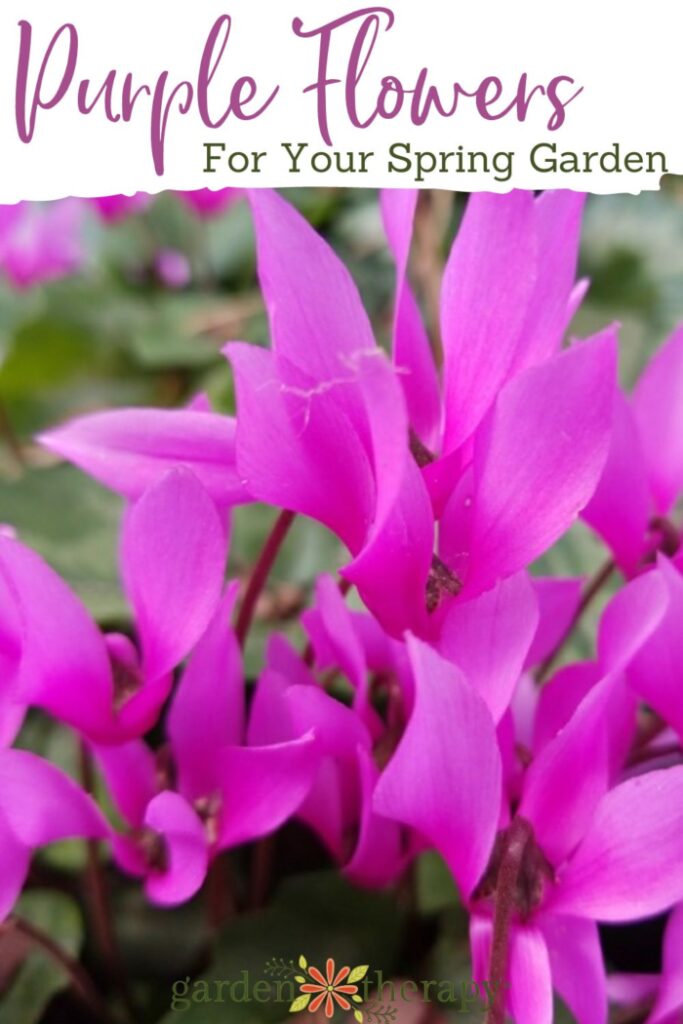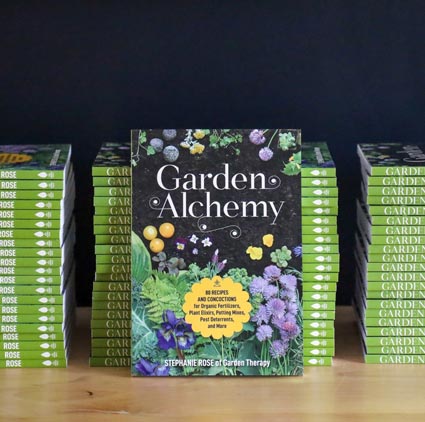Have you ever dreamed of a meadow full heather, lavender, crocus, and violets? Nothing captures the attention in a garden quite like a sea of purple. After the gloom of winter, we need a little purple to brighten things up. Add these purple flowers this spring for an instant serotonin boost!
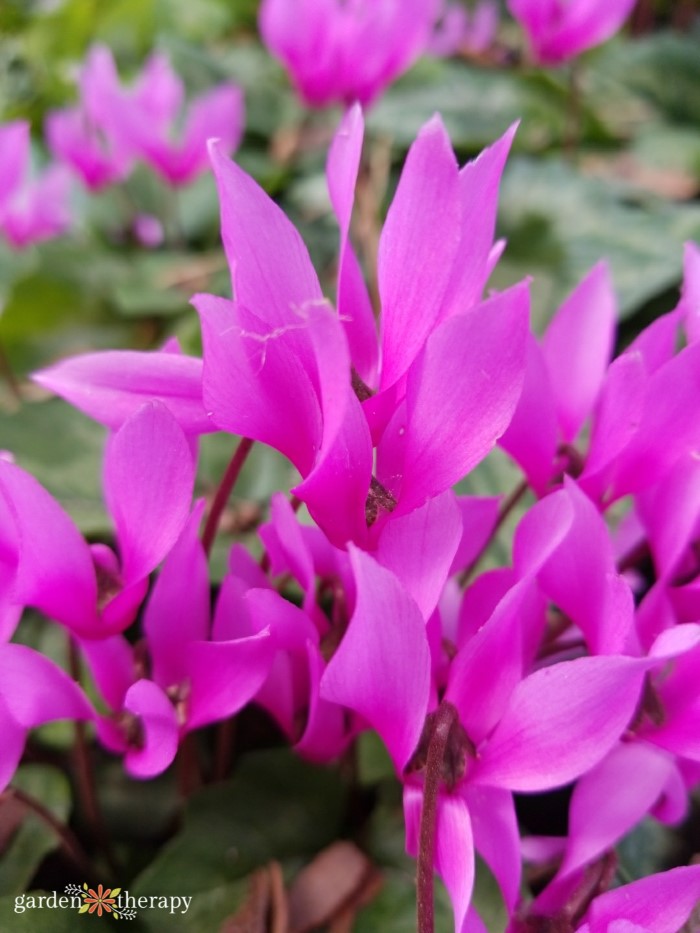
In the plant world, purple flowers are very happy and vibrant. Come springtime, the colour quickly jumps out through the white and brown of winter and it’s truly a gift. Sometimes, you can even get some winter flowering purple plants.
I’ve always had an affinity for purple flowers. Just take a look at my Garden Alchemy cover! When I took the photo for the book, I went out into my garden and picked what was lovely and blooming. I let the garden decide what it would look like.
Taken in May, it turned out very purple, yellow, and green. Purple is very much the colour of spring!
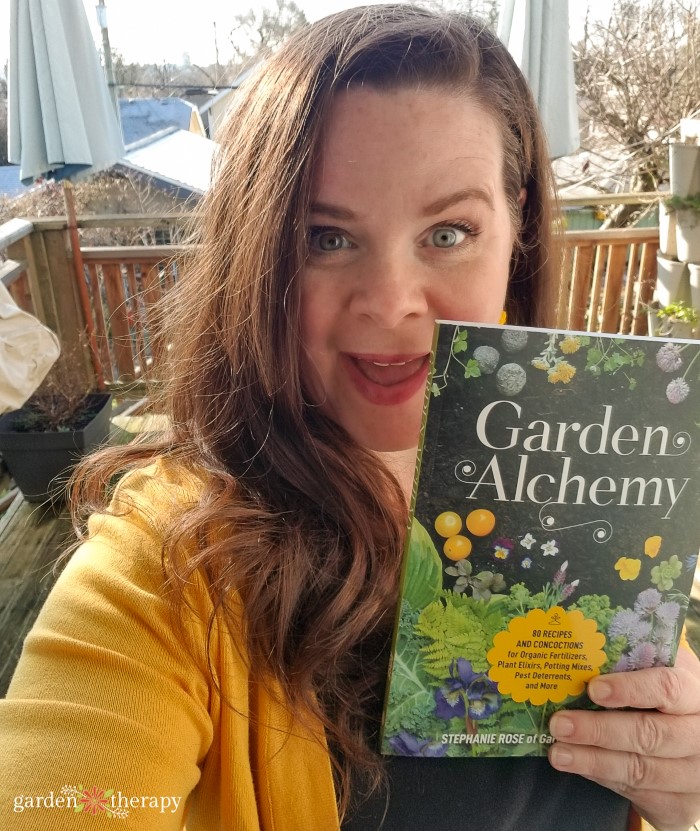
Depending on what you mix it with, your garden can turn into all kinds of moods with purple flowers. Mixed with greens and blue flowers, it feels sophisticated and elegant. Paired with reds, your garden will emit deep passion. With white or pink, your eye is instantly drawn to the fairy-tale-like colour combination.
Purple is by no means is a rare colour in nature. There are a lot of purple flowers out there, but these are my favourites that you can find blooming during springtime.
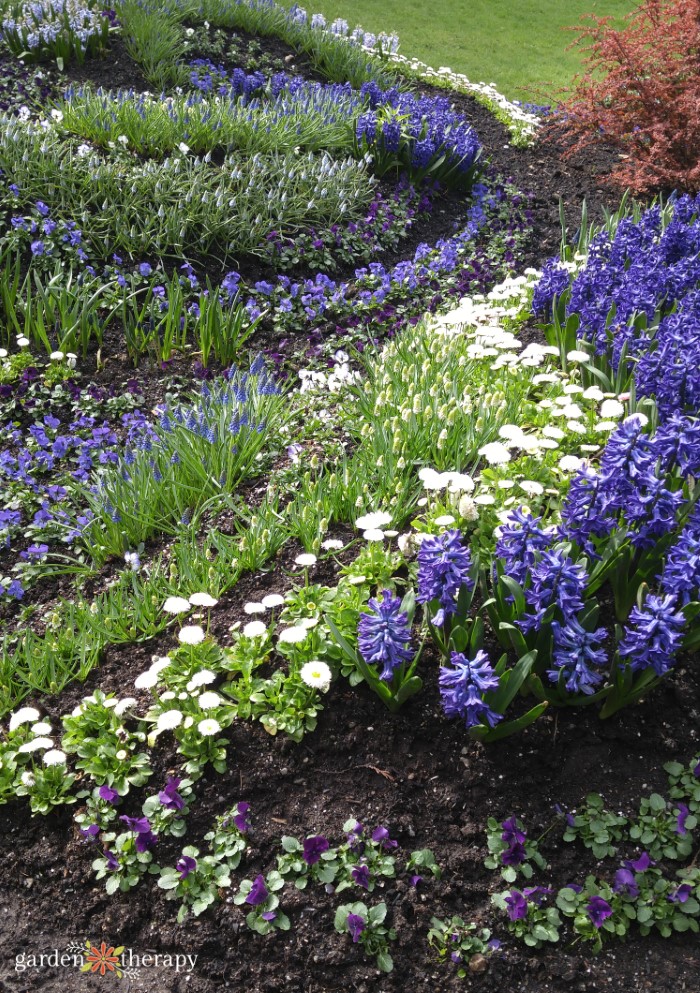
This post includes…
- Purple Flowers for Spring Colour
- Dutch Iris
- Tulip
- Pansies
- Wild Violets
- Common Lilac
- Hellebores
- Crocus
- English Lavender
- Bugleweed
- Dutch Hyacinth
- Primrose
- Cyclamen
- Columbine
- Sweet Alyssum
- Lupine
- Grape Hyacinth
- Bishop’s Hat
- Ornamental Onions
- Checkered Lily
- Heather
- Bonus Purple Flowers
- Purple Foliage
- Purple Edibles
- Purple Shrubs and Trees
- Frequently Asked Questions About Purple Flowers
- More Posts About Flowers
Purple Flowers for Spring Colour
Dutch Iris
Iris x Hollandica
Few flowers are as tall and proud as the Dutch iris. A wonderful cut flower, many grow the iris to make a statement either in the garden or inside in a vase. Plant them as a fall bulb and come spring enjoy their deep purple flowers and slender stalks.
- Zone: 6-9
- Blooming Time: May to July
- Sun: Full sun
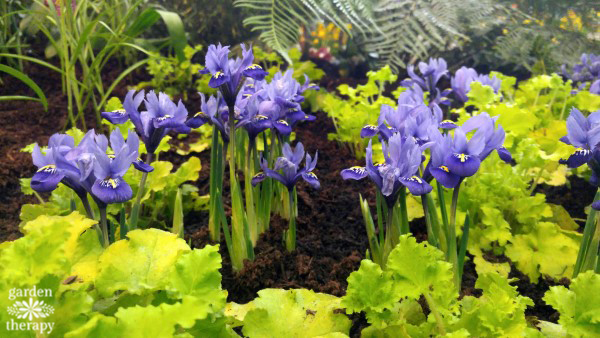
Tulip
Tulipa spp.
A timeless favourite, tulips come in practically every colour of the rainbow, purple included! They work well in pots and borders. You can plant them in the fall for spring blooms or try your hand at forcing them indoors.
- Zone: 3-8
- Blooming Time: April to May
- Sun: Full sun
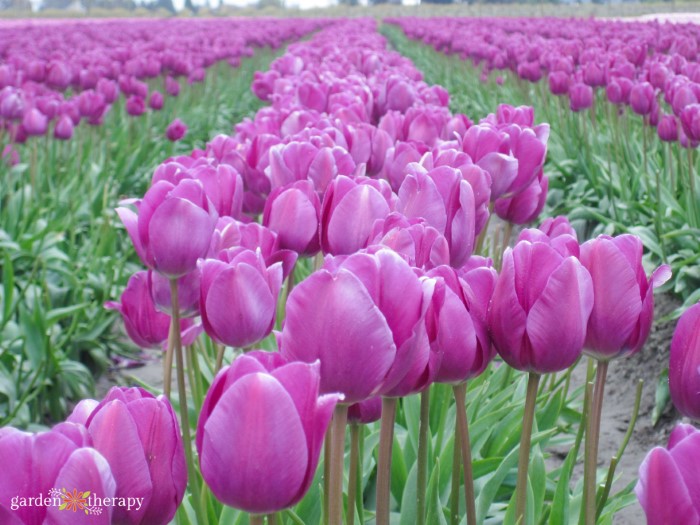
Pansies
Viola x wittrockiana
Every garden centre and even grocery store will start to sell pansies in early spring. You can plant them as soon as the ground is workable as they’re frost tolerant. With tons of colour options available, they look like they have little smiling faces. Instead of pansies, you can also grow the smaller version of violas.
- Zone: 3-8
- Blooming Time: April to June
- Sun: Partial sun
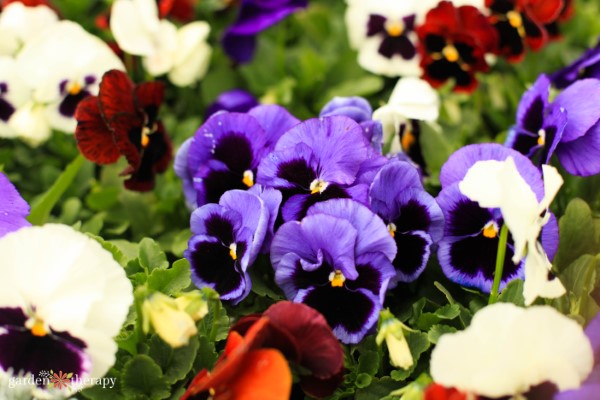
Wild Violets
Viola odorata
Some may call these little purple flowers weeds, but I love how they look when spread across a lawn! Plus, they’re edible and look beautiful as garnishes. You can plant them any time during the spring and they’re quick to self-seed and spread, coming back year after year.
- Zone: 3-9
- Blooming Time: Late winter to early spring
- Sun: Partial sun
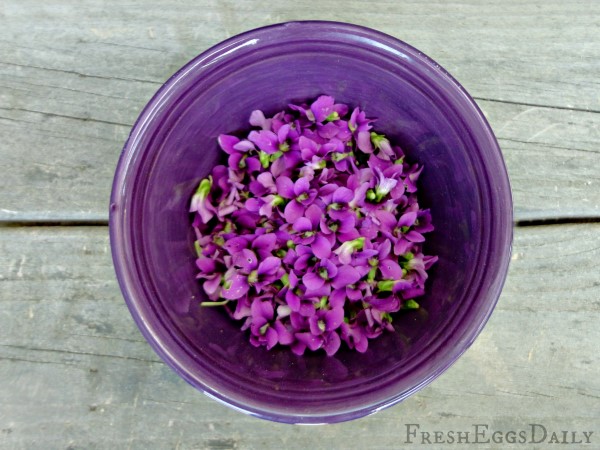
Common Lilac
Syringa vulgaris
An extremely fragrant shrub, few can pass the lilac without stopping for a sniff. Because of their fragrance and beauty, many cut their blooms and bring them inside. Plant them in the fall or spring depending on when they’re available at your garden centre.
- Zone: 5-7
- Blooming Time: April to June
- Sun: Full sun
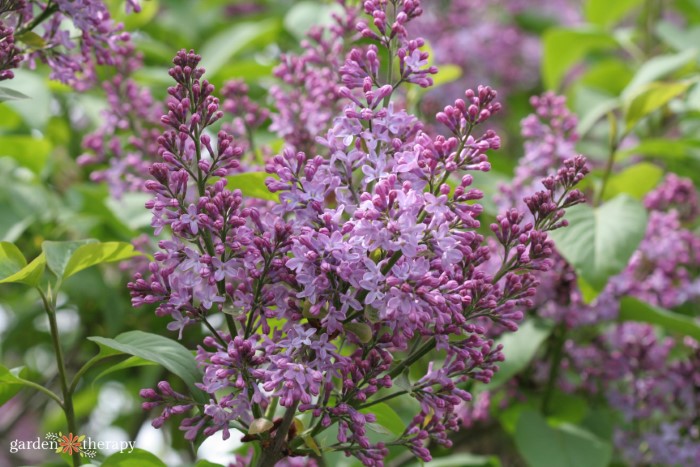
Hellebores
Helleborus spp.
These shady-lovers are one of the first flowers you will see in the winter. But, you have to look for them! Hellebores flowers hang down but are beautiful if you stop to notice them. Plant hellebores in the autumn if they’re hardy in your area or in the spring. Look for H. atrorubens or H. croaticus for noticeable purple.
- Zone: 6-9
- Blooming Time: January to April
- Sun: Partial shade
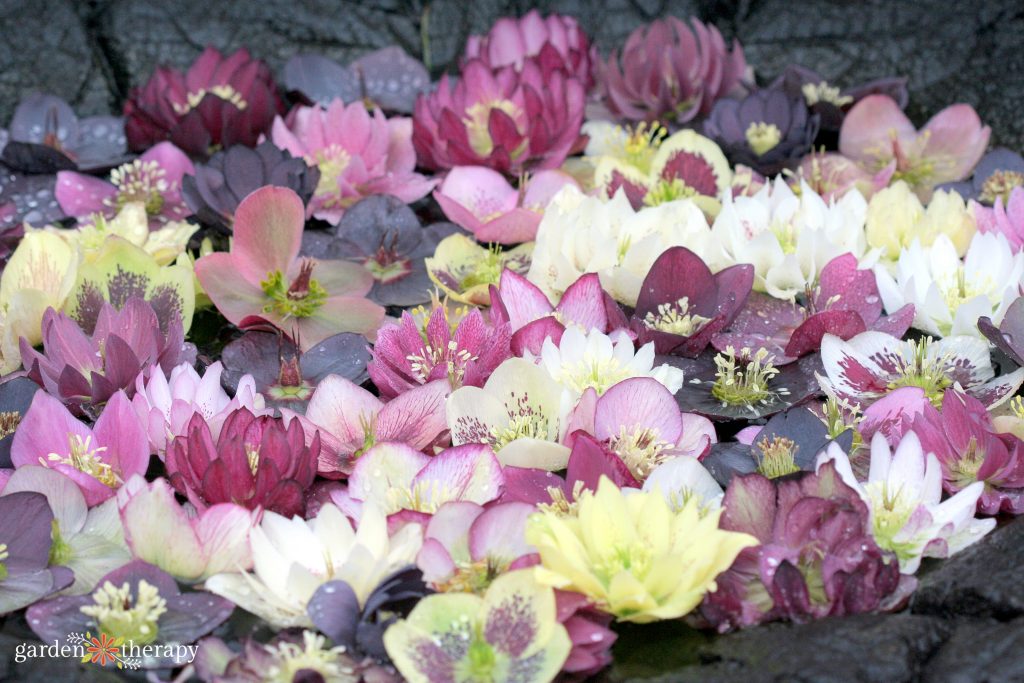
Crocus
Crocus spp.
Crocus is one of the earliest indicators of spring. Planted in autumn, they grow from tiny corms that can quickly spread throughout your garden or lawn. For true spring colour, consider naturalizing your lawn with crocuses.
- Zone: 3-8
- Blooming Time: February to April
- Sun: Full Sun
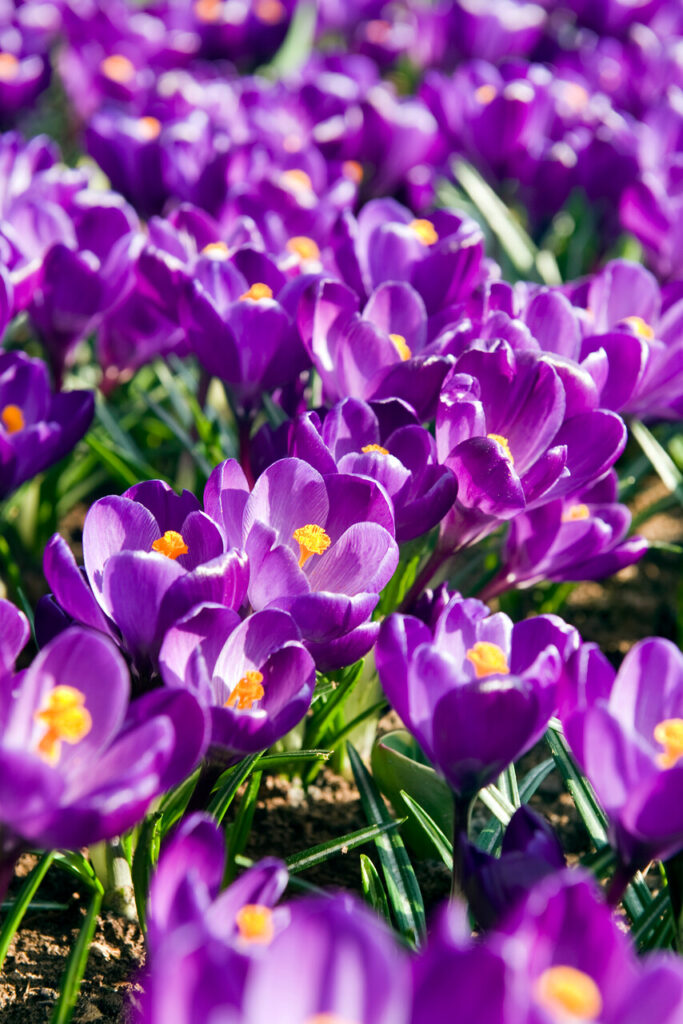
English Lavender
Lavandula angustifolia
Lavender just sneaks onto the spring purple flower list as you can get blooms at the very end of spring. While ornamental, people also grow English lavender for culinary purposes and for aromatherapy. Its gorgeous herbal scent is known for its calming nature.
- Zone: 7-8
- Blooming Time: June to July
- Sun: Full sun
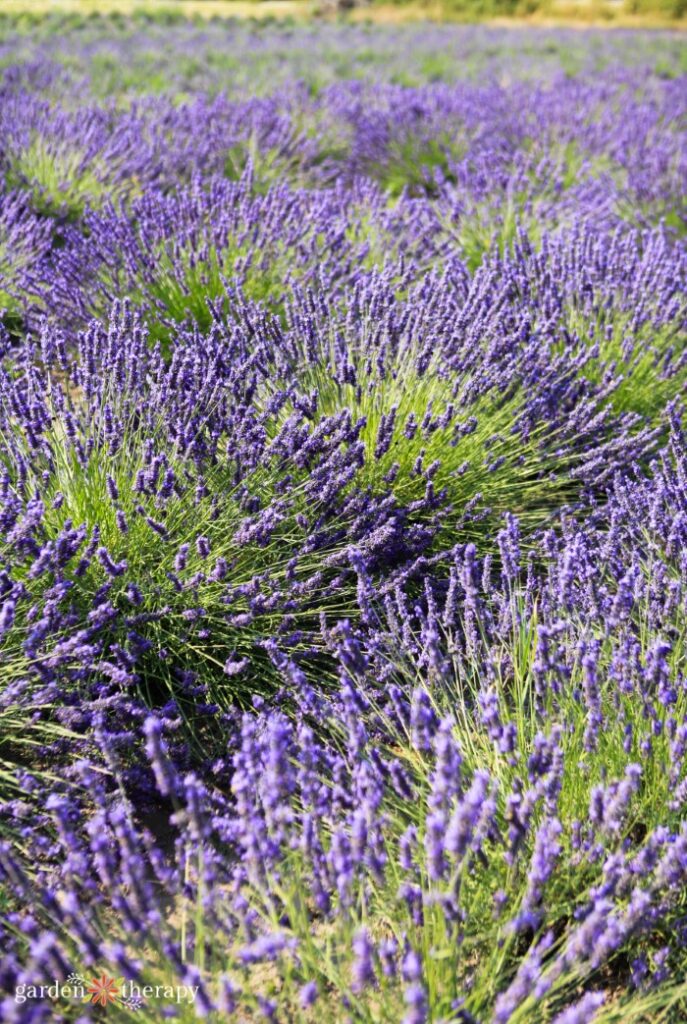
Bugleweed
Ajuga reptans
If you want something a little less traditional, try growing bugleweed. It has purple flower spikes and dark foliage that can come variegated. Fast-growing, it can get invasive when planted close to lawns. For purplish foliage, look for the ‘Atropurpureum’ and ‘Black Scallop’ cultivars
- Zone: 3-10
- Blooming Time: May to June
- Sun: Full sun to partial shade
Dutch Hyacinth
Hyacinthus spp.
A classic spring bulb, you won’t find many plants as fragrant as the hyacinth. They grow a spike of bell-shaped flower clusters that come in an array of colours. Plant the bulb in the fall to enjoy in the spring or find already forced bulbs to add to containers.
- Zone: 4-8
- Blooming Time: March to April
- Sun: Full sun to partial shade
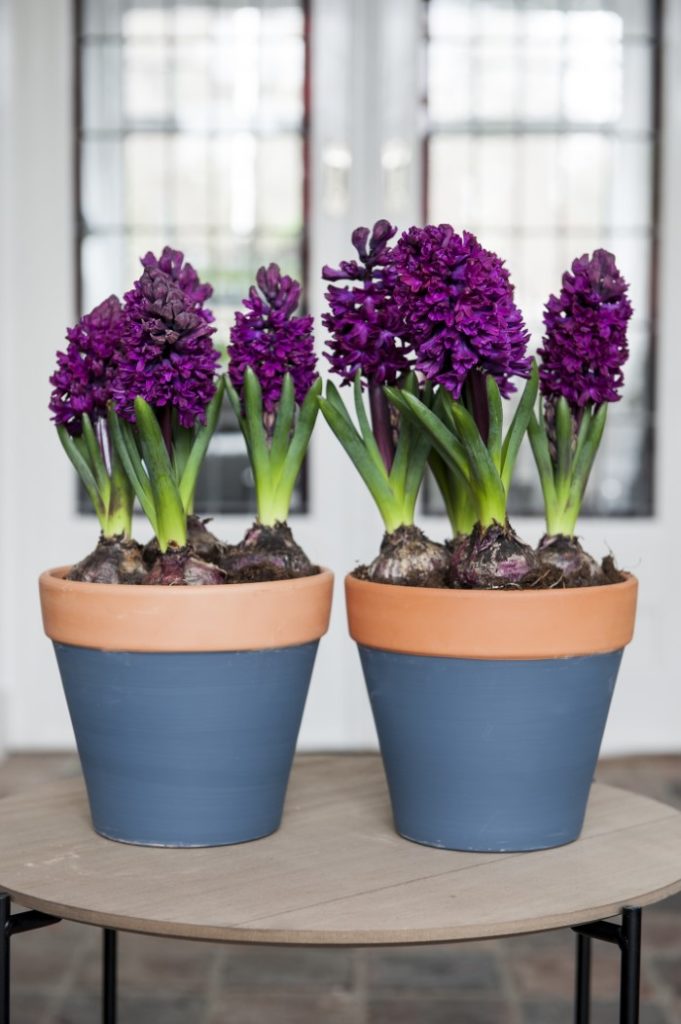
Primrose
Primula x polyantha
Many think of the primrose as a yellow flower, but many cultivated forms include purple varieties. You can find them in deep purples with a bold yellow center. They naturalize easily and can be divided after a couple of years in the garden.
- Zone: 2-8
- Blooming Time: March to May
- Sun: Full sun to partial shade
Cyclamen
Cyclamen persicum
While many people grow cyclamen as houseplants, individuals can grow hardy spring cyclamen in zones 9-11. Their small sweet flowers rise above the foliage, ranging in bold to pastel shades.
- Zone: 9-11
- Blooming Time: December to March
- Sun: Partial sun
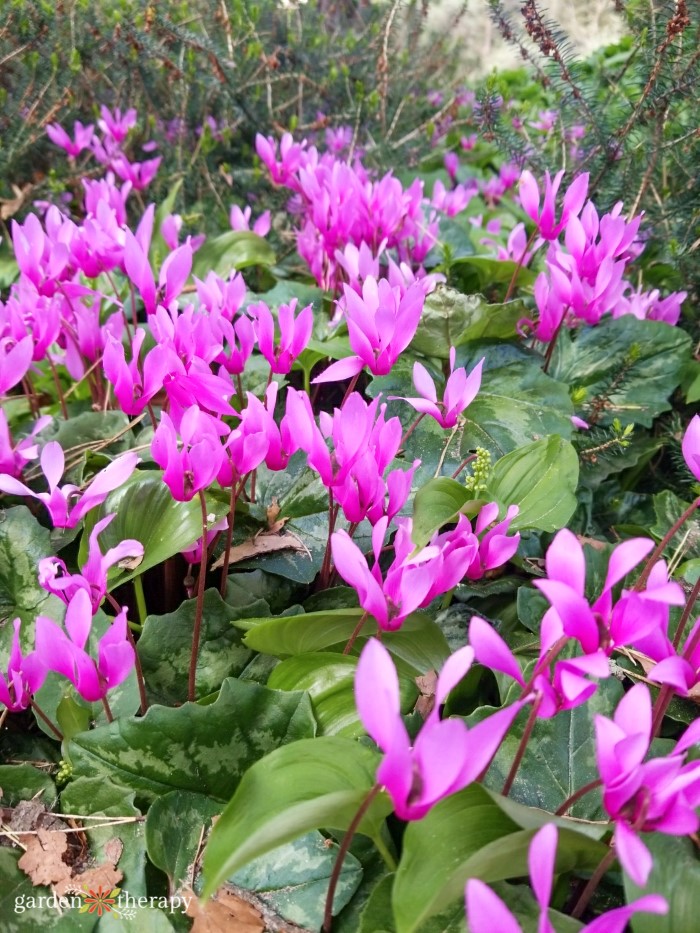
Columbine
Aquilegia spp.
These delicate flowers make a quiet entrance to the garden but will go appreciated by all those who stop to take a look. You can sow seeds in early spring indoors but keep in mind they need 3-4 weeks of cold to grow. They’re very good at reseeding so don’t deadhead the flowers! Try the ‘Biedermeier’ cultivar.
- Zone: 3-8
- Blooming Time: April to May
- Sun: Full sun to partial shade
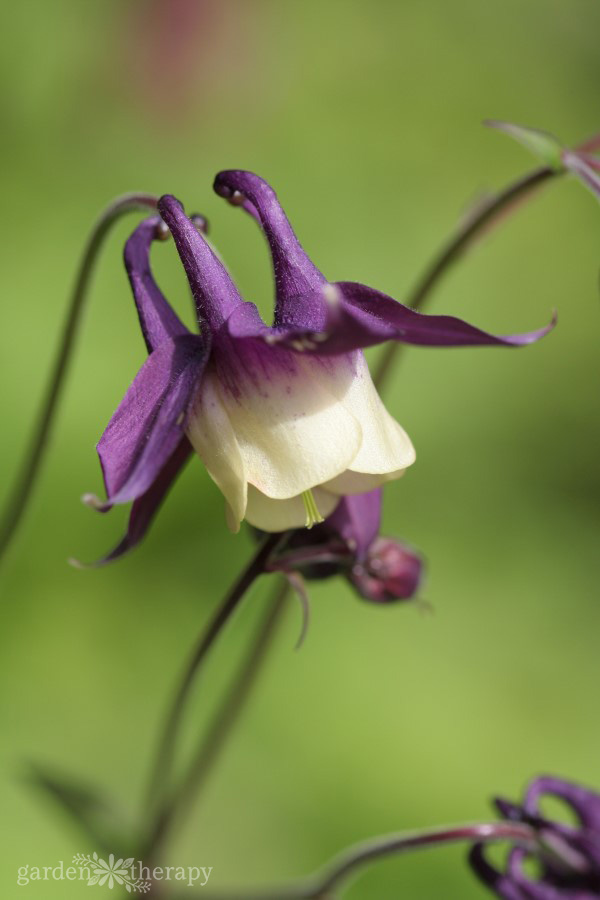
Sweet Alyssum
Lobularia maritima
These hardy little flowers may be small, but they’re plenty. They have a sweet, honey-like fragrance and are used primarily as a blanket flower. They self-sow, quickly filling nooks and crannies. Once they’ve bloomed in the spring, they’ll go into a lull in the summer before blooming again in the fall.
- Zone: 5-9
- Blooming Time: early spring, early fall
- Sun: Full sun to partial shade
Lupine
Lupinus x hybrida
While they may be named after wolves, they’re members of the gentle pea family. You can find both annual and perennial versions of lupine. Rainbow seed mixes are fairly popular but you can also get them in purple and blue shades.
- Zone: 4-8
- Blooming Time: Spring through summer
- Sun: Full sun
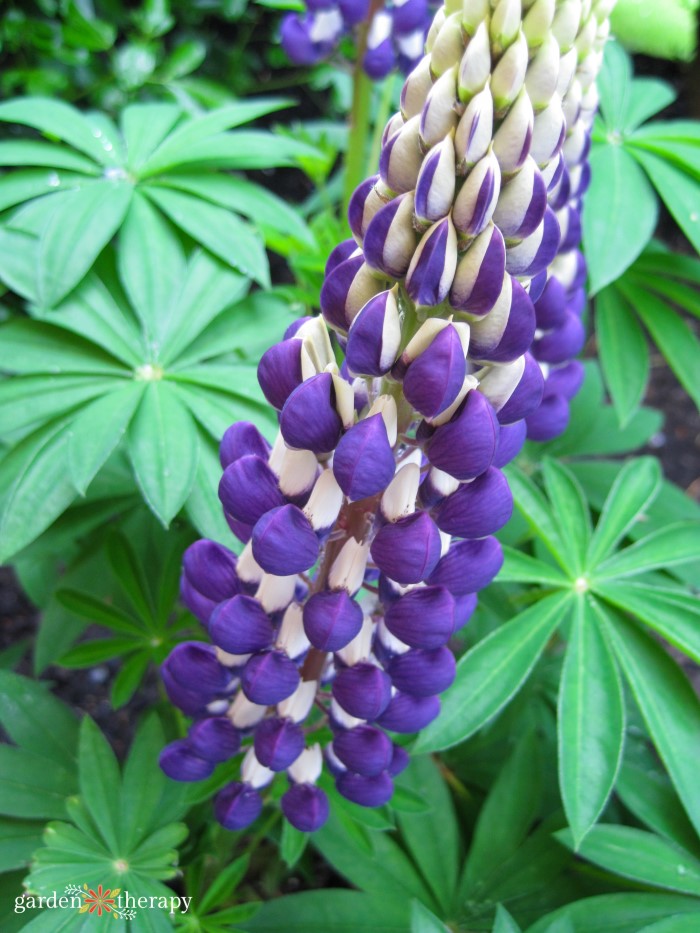
Grape Hyacinth
Muscari armeniacum
While the name may suggest otherwise, grape hyacinths are actually not related to the Dutch hyacinth. These small bulb flowers work well in containers, borders, and naturalized lawns.
- Zone: 4-8
- Blooming Time: April to May
- Sun: Full sun
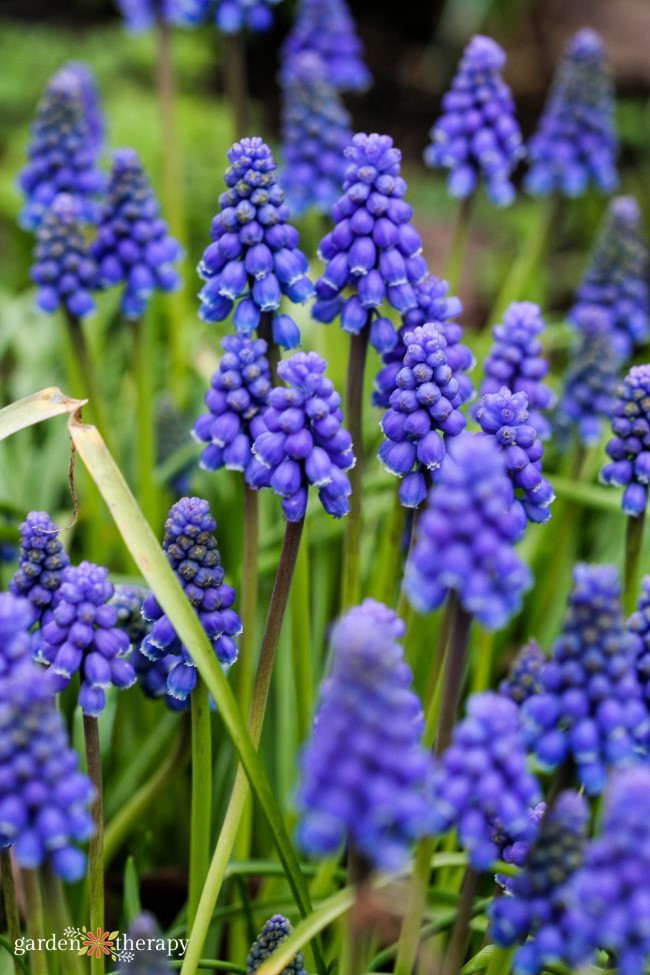
Bishop’s Hat
Epimedium
These shade-loving plants are perfect in a woodland garden. With little flowers hiding under the heart-shaped leaves, you have to actively seek these flowers. Otherwise, just the fairies get to enjoy them! Good ground cover plants, look for the ‘Purple Pixie’ cultivar.
- Zone: 5-8
- Blooming Time: April to June
- Sun: Partial shade
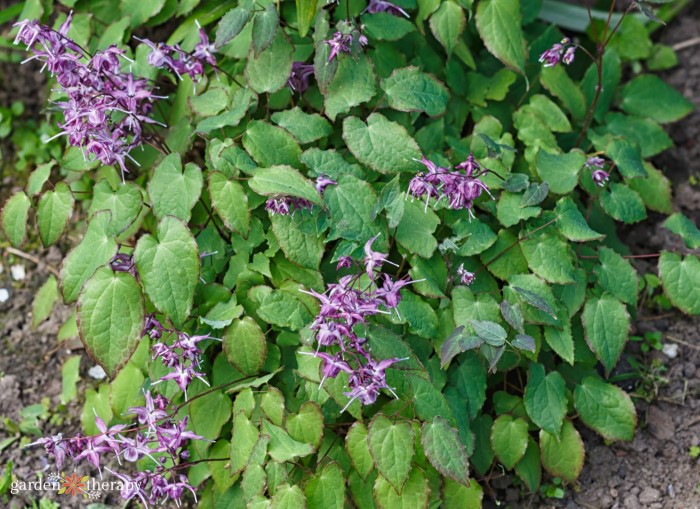
Ornamental Onions
Allium spp.
These aren’t your typical onions. Loved by bees, these large globe-shaped purple flowers make an impact in the garden. Once they’ve finished blooming, leave them alone and they’ll turn into sculptural seed heads.
- Zone: 3-9
- Blooming Time: April to June
- Sun: Full sun
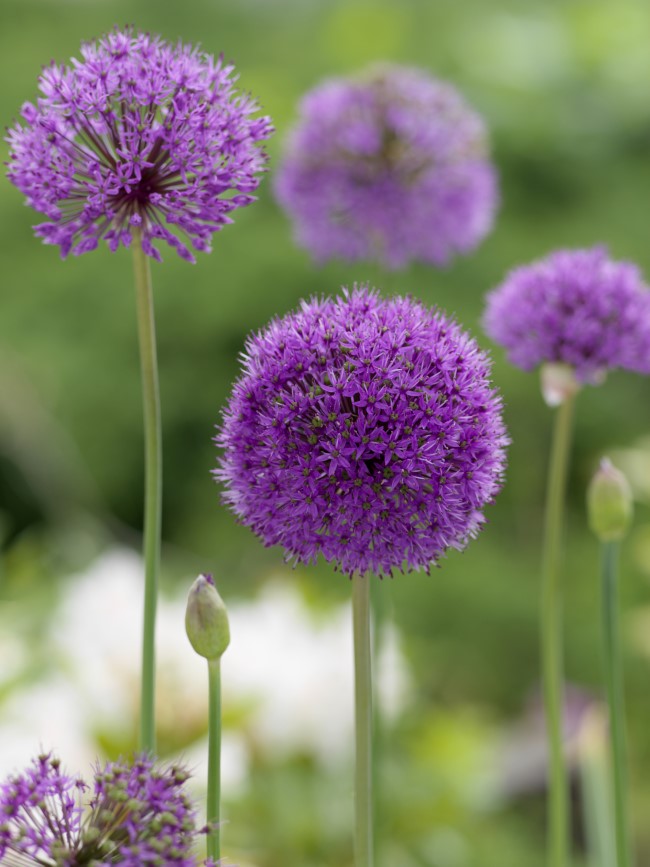
Checkered Lily
Fritillaria meleagris
It’s hard to believe that you can find checkered patterns in nature, yet here we are! This lily has purple and white checkers that hang down from slender stems. Plant this bulb in the fall if you want to add it to your spring garden.
- Zone: 3-8
- Blooming Time: April to May
- Sun: Full sun to partial shade
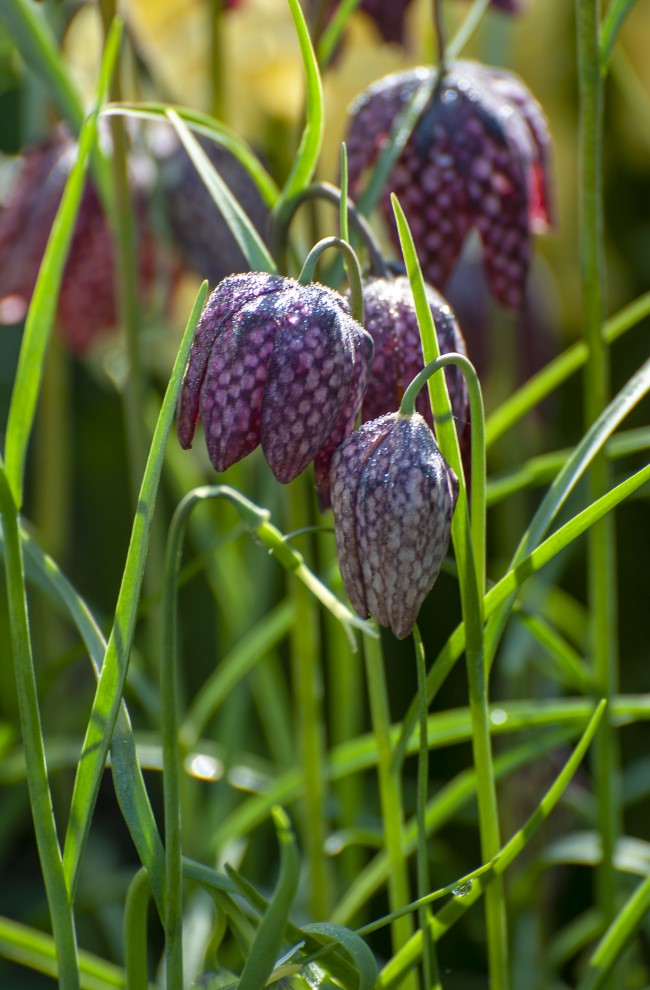
Heather
Erica carnea
Look for spring-flowering heather at your garden center for early blooms as opposed to the summer-flowering heather. Bees adore this compact evergreen shrub giving them early access to pollen when few other flowers can.
- Zone: 5-9
- Blooming Time: December to April
- Sun: Partial shade

Bonus Purple Flowers
Can’t get enough of purple? Here are some bonus purple flowers you can plant in your garden to extend the vibrant colour well into the fall.
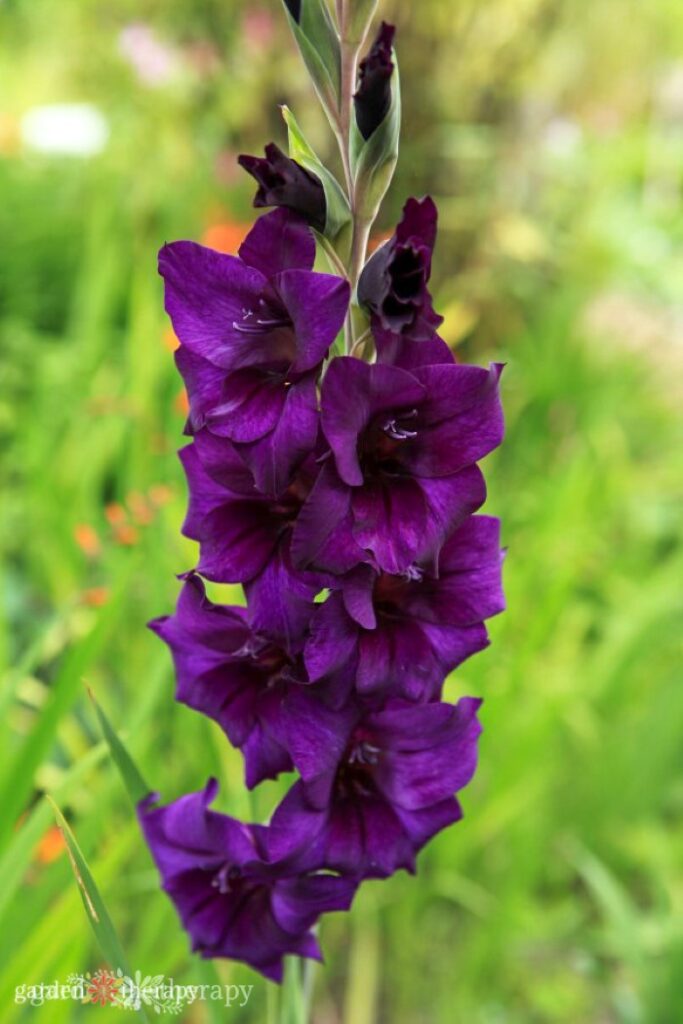
- Gladiolus (Gladiolus palustris)
- Impatiens (Impatiens ‘Divine Violet’)
- Purple Geramium (Geranium viscosissimum)
- Morning Glory (Ipomoena Purpurea)
- Wishbone Flower (Torenia fournieri)
- Larkspur (Consolida ajacis)
- Dahlia (Dahlia spp.)
- Verbena (Verbena spp.)
- Peach-Leaved Bellflower (Campanula persicifolia)
- Catmint (Nepeta spp.)
- Monkshood (Aconitum napellus)
- Anemone (Anemone spp.)
- Stock (Matthiola Incana)
- Dianthus (Dianthus ‘Supra Purple’)
- Calibrachoa (Calibrachoa spp.)
- Floss flower (Ageratum Houstonianum)
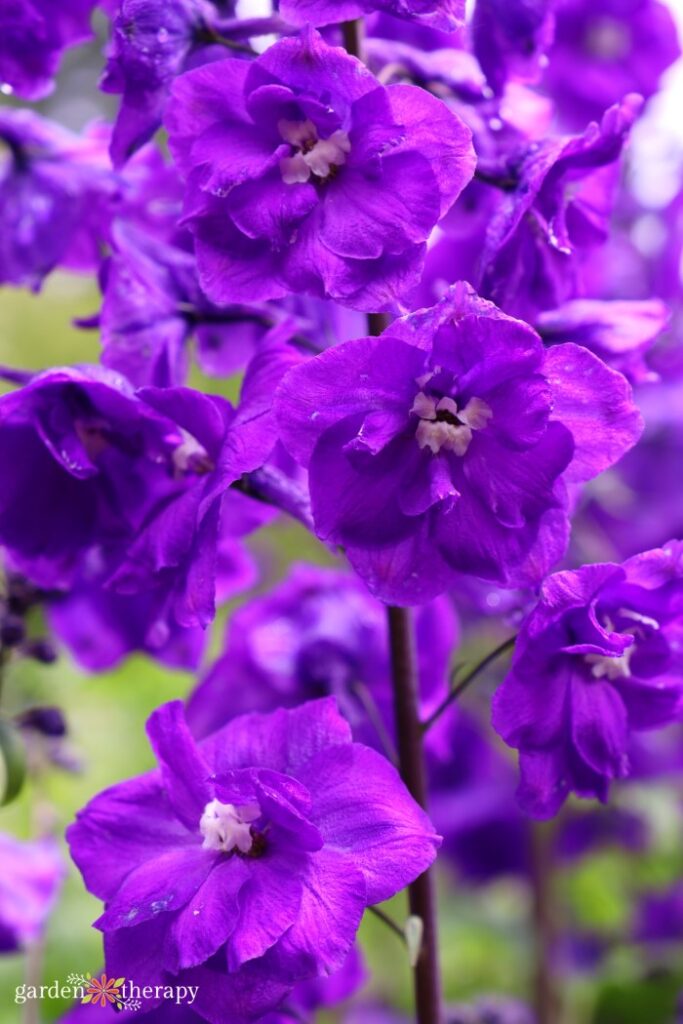
- Delphinium (Delphinium ‘Black Knight’)
- Purple Coneflower (Echinacea purpurea)
- Zinnia Elegans (Zinnia violacea)
- Petunia (Petunia x hybrida)
- Fuschia (Fuchsia spp.)
- Liatris (Liatris spicata)
- Lupin (Lupinus ‘Purple Swirl’)
- Ranunculus (Ranunculua ‘Purple Sensation’)
- Purple Mums (Chrysanthemum morifolium)
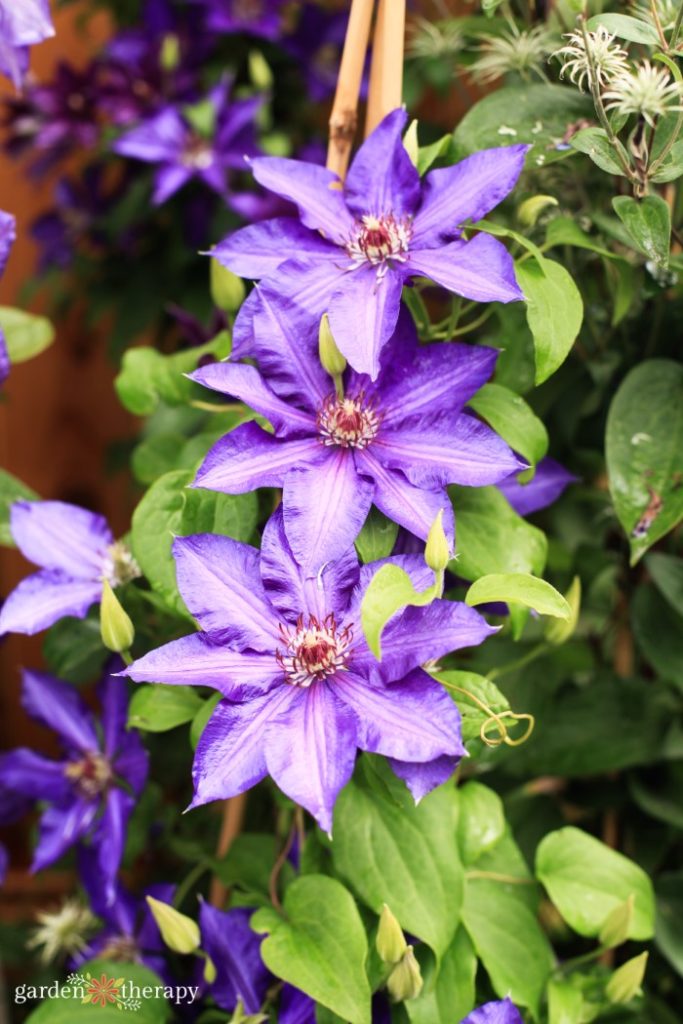
- China Aster (Callistephus Chinensis)
- Salvia (Saliva spp.)
- Canterbury Bells (Campanula medium)
- Calibrachoa (Calibrachoa ‘Superbells Plum’)
- Sweet Pea (Lathysus Odoratus)
- Hollyhock (Alcea Rosea ‘Purple Queen’)
- Cosmos (Cosmos bipinnatus)
- Clematis (Clematis spp.)
Purple Foliage
Beyond the flowers, these plants have gorgeous purple-hued leaves to add some moody elements and colour to your garden throughout the year.
- Coral Bells (Heuchera ‘Forever Purple’)
- Purple Leaf Plum (Prunus cerasifera)
- Sedum (Sedum telephium ‘Purple Emperor’
- Sea Holly (Eryngium planum)
- Purple Ninebark (Physocarpus opulifolius)
- Barberries (Berberis thunbergii)
- Crab Apple (Malus sp.)
- Elderberries (Sambucus nigra)
- Japanese Maple (Acer palmatum)
- Purple Leaf Sand Cherry (Prunus X cistena)
- Ornamental Kale (Brassica oleracea var. acephala)
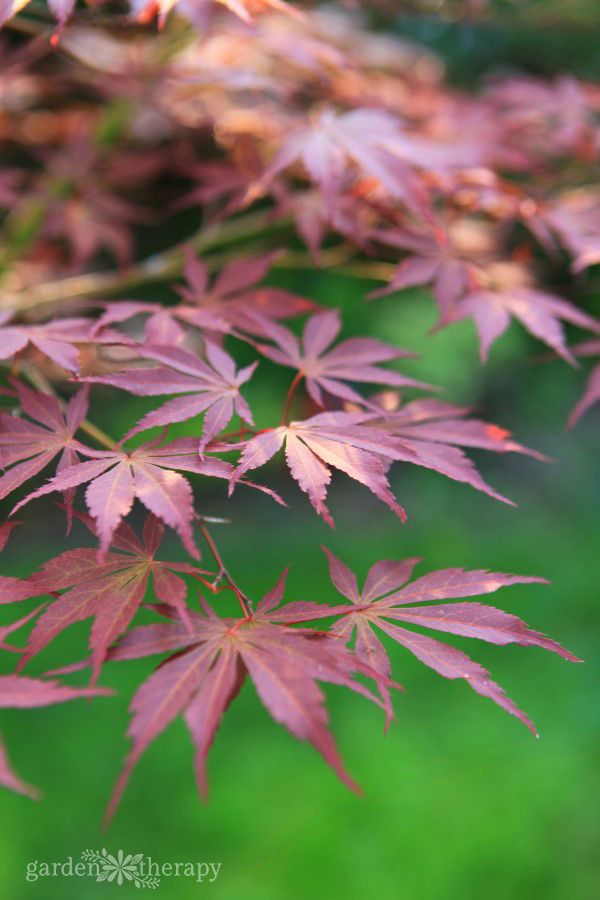
Purple Edibles
Not only are these purple flowers a beauty, but you can munch on them too!
- Viola (Viola spp.)
- Chive (Allium schoenoprasum)
- Thyme (Thymus vulgaris)
- Midnight Blue Rose (Rosa ‘Midnight Blue’)
- Daylily (Hemerocallis ‘Purple de Oro’)
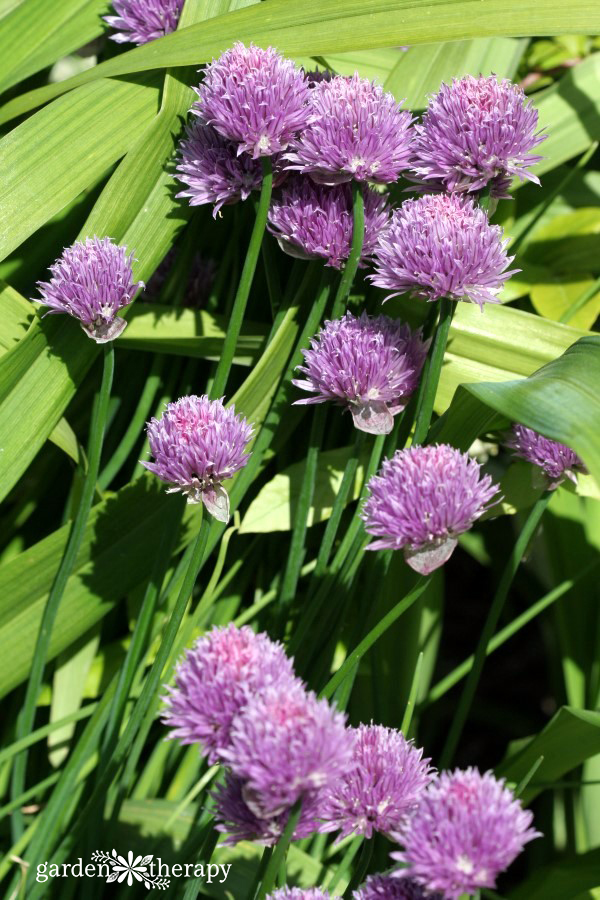
Purple Shrubs and Trees
To really make a pop a purple in your yard, purple flowering bushes and trees with purple flowers are sure to wow with their varying tones from summer to even winter.
- Heliotrope (Heliotropium Arborescens)
- Hydrangea (Hydrangea spp.)
- Butterfly Bush (Buddleia davidii)
- Rhododendron (Rhododendron x ‘Purple Gem’)
- Chinese Wisteria (Wisteria sinensis)
- Blue Beard (Caryopteris x clandonensis ‘Dark Knight’)
- Golden Dewdrop (Duranta erecta)
- Beautyberry (Callicarpa americana)
- Crape Myrtle (Lagerstroemia indica)
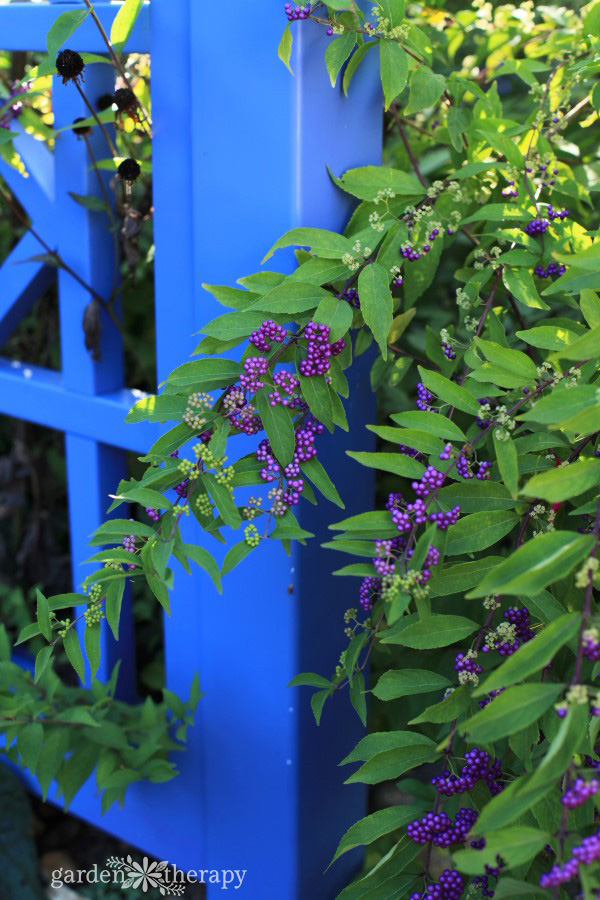
Frequently Asked Questions About Purple Flowers
The colour of royalty, purple also represents success and respect. Because of their soothing colour, people also recognize purple as a colour of harmony, peace, and spiritual awareness. Check out this post for more on flower symbolism.
A few “weeds” out there have purple flowers. Common weeds with purple flowers include thistle, wild violets, henbit, forget-me-nots, deadnettle, and ground ivy.
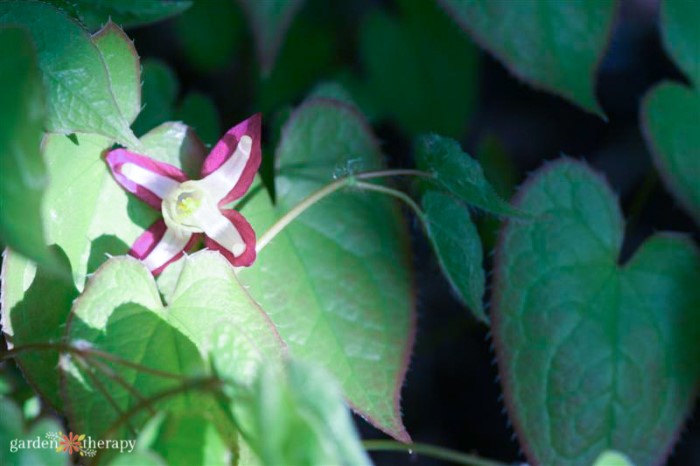
Do you have a favourite purple flower? Tell me in the comments down below which purple flowers you’re adding to your garden.

